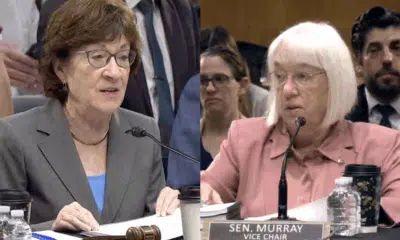News from the South - Arkansas News Feed
Free school breakfast, maternal health Medicaid, school cellphone ban all become Arkansas law
Free school breakfast, maternal health Medicaid, school cellphone ban all become Arkansas law
by Tess Vrbin, Arkansas Advocate
February 21, 2025
About halfway through Arkansas’ 2025 legislative session, some of Gov. Sarah Huckabee Sanders’ policy priorities have become law while others have yet be debated by lawmakers.
On Thursday afternoon, Sanders signed three bills she championed:
Act 122 requires Arkansas school districts to ban students’ access to cellphones and personal electronic devices during the school day;Act 123 will provide free breakfast to Arkansas students regardless of their eligibility for the federal free or reduced-price meal program beginning with the 2025-2026 academic year;Act 124 — the Healthy Moms, Healthy Babies Act — changes the state’s Medicaid program by establishing presumptive Medicaid eligibility for pregnant Arkansans, offering reimbursements for doulas and community health workers, and establishing pregnancy-related Medicaid coverage for specific treatments.
All three bills passed the House and Senate with bipartisan support.
Sanders named the free breakfast policy and the school phone ban as legislative goals in her State of the State speech on Jan. 14, the second day of the session.
In a press conference before signing both bills Thursday, Sanders reiterated two more goals that have yet to be taken up by lawmakers: the elimination of the state’s 0.125% grocery sales tax and a higher-education overhaul bill.
“We will have a productive session, helping families here in Arkansas live their very best lives,” Sanders said.
So far no legislation has been filed to eliminate the grocery tax, but lawmakers filed Sanders’ proposed higher education omnibus policy, Arkansas ACCESS, in two identical bills Monday.
The bills propose creating a universal college application, a common course-numbering system among all institutions, a direct admissions program that would establish provisional admission to students who meet basic standards and a statewide transfer system that would allow the transfer of college credits between universities and two-year institutions to work both ways.
Bills flesh out Arkansas governor’s higher-education overhaul proposal
Among other things, the bills would also consolidate a number of high school college-level courses into a single “accelerated learning” program that seeks to increase the number of students who graduate from institutions of higher education.
House Speaker Brian Evans, R-Cabot, said Thursday that Arkansas ACCESS is not likely to be heard in committee before early March. He said the bills might see some minor amendments before then.
“It looks to me that it’s going to be a very positive piece of legislation, and I fully expect to see strong support in the House,” Evans said in a press conference.
The new laws
Sanders signed the Healthy Moms, Healthy Babies Act two weeks after announcing the policy. The policy moved fairly smoothly through the legislative process, though some lawmakers expressed concerns about a clause on the final page that would make a child’s fifth birthday the statute of limitations for any actions against alleged medical injuries during birth.
Previously, the law allowed a minor or his or her legal guardian to “commence an action” on an alleged medical injury by the child’s 11th birthday or two years after the injury occurred, depending on which is later.
Some lawmakers said their concerns about reducing this statute of limitations meant they could not vote for the legislation, while others voted for it despite their qualms.
Arkansas Advocates for Children and Families expressed frustration that the law does not expand Medicaid coverage for postpartum mothers from 60 days to 12 months after birth. Arkansas is the only state that has not taken advantage of this federal option.
Arkansas has one of the highest maternal mortality rates in the nation, and the third-highest infant mortality rate, according to the Arkansas Center for Health Improvement.
Additionally, at a rate of nearly 19%, Arkansas had the highest prevalence of food insecurity in 2023, according to a U.S. Department of Agriculture report released in September.
Sen. Clarke Tucker, D-Little Rock, was among dozens of lawmakers who co-sponsored Act 123. At Thursday’s press conference, he said the law will have “a truly monumental impact” on Arkansas families, and he praised Sanders for following through on her promises to support policies that reduce food insecurity.
In 2023, many of the same lawmakers that sponsored Act 123 put forth Act 656, which eliminated the co-pay for reduced-price school breakfasts and lunches.
Act 123 will be supported by federal funds as well as state general revenue, private grants and taxes from Arkansas’ billion-dollar medical marijuana industry.
The Arkansas Hunger Relief Alliance worked on both Act 656 and Act 123, said Patty Barker, the organization’s No Kid Hungry Arkansas campaign director.
“We want to provide students with all the resources they need to thrive in school, and you’ve got to begin with breakfast,” Barker said in an interview.
Arkansas last year opted into the Summer EBT program, a new federal assistance program that provides $120 in food benefits to students during summer break. The Department of Human Services has stated that Summer EBT benefited 260,000 families in 2024, and the state will again participate in the program this year.
Act 122 is the Bell to Bell, No Cell Act, a policy that Sanders and the Arkansas Department of Education offered as a pilot program for public school districts last year. In August, lawmakers allowed the Department of Education to distribute $7 million among school districts to pay for pouches or lockers where students can store their phones during class time.
“Teachers say their students are more engaged, less anxious, and many are happy they no longer have to be the phone police and can actually focus on teaching,” Sanders said, touting the success of the pilot program before signing Act 122.
YOU MAKE OUR WORK POSSIBLE.
Sanders and lawmakers have repeatedly warned that excessive access to cell phones and social media has a negative impact on children’s mental health.
“What we’re trying to do is bring back an amazing environment to our schools where [kids] can have authentic, positive relationships, not only with administrators, but also with each other,” Sen. Tyler Dees, R-Siloam Springs, said at the press conference.
Dees and Rep. Jon Eubanks, R-Paris, sponsored both Act 122 and the Social Media Safety Act of 2023, which would have been the first in the nation to require minors to receive parental permission before signing up for a social media account. A federal judge blocked the law in August 2023 before it was set to take effect.
Sanders said in January that the Legislature should amend the Social Media Safety Act this session “so that it’s no longer held up in court and can begin to be enforced.” So far no such legislation has been filed.
Other policies she mentioned in her State of the State address that have yet to be filed as bills include:
The final draft of a revamped state employee pay plan;A ban on foreign “adversaries,” such as the Chinese government, from purchasing farmland in certain areas;The Defense Against Criminal Illegals Act, which Sanders said will give “violent illegal immigrants” harsher penalties for criminal offenses and “remove them from our state.”
She expressed support for allowing property owners to enlist their local sheriff’s offices to remove squatters from their land. House Bill 1049 would do so, and it awaits action in the Senate after passing the House.
Sanders said in December and January that Arkansas will seek permission from the U.S. Department of Agriculture to prohibit food stamp recipients from purchasing highly processed foods and encourage consumption of more nutritious, locally grown foods. Senate Bill 217 would fulfill this promise and awaits a committee hearing.
Arkansas Advocate is part of States Newsroom, a nonprofit news network supported by grants and a coalition of donors as a 501c(3) public charity. Arkansas Advocate maintains editorial independence. Contact Editor Sonny Albarado for questions: info@arkansasadvocate.com.
The post Free school breakfast, maternal health Medicaid, school cellphone ban all become Arkansas law appeared first on arkansasadvocate.com
News from the South - Arkansas News Feed
High-speed chase in Arkansas leads to life sentence for Florida man
SUMMARY: A Florida man, Derrick Scudder, was sentenced to life in prison in Arkansas for leading a high-speed chase across two states while trafficking suitcases containing 240 pounds of methamphetamine and over 2 pounds of fentanyl. The dangerous chase involved speeds over 110 mph near schools, crashing into police vehicles, and a foot pursuit before arrest. Scudder, with ten prior felony convictions, pleaded guilty to all charges. A jury recommended life imprisonment plus 80 years for trafficking and fleeing police, marking the first life sentence for fentanyl trafficking in Crawford County. His co-defendant, Matthew Bunch, awaits trial.
According to arrest affidavits, police found two suitcases containing 240 pounds of methamphetamine and more than two pounds of fentanyl after a high-speed chase ended near Alma, Arkansas in October 2024.
Subscribe to 40/29 on YouTube now for more: http://bit.ly/PTElbK
Get more Northwest Arkansas news: http://www.4029tv.com
Like us: http://facebook.com/4029news
Follow us: http://twitter.com/4029news
Instagram: https://www.instagram.com/4029news/
News from the South - Arkansas News Feed
Why congressional redistricting is blowing up across the US this summer
by Shauneen Miranda and Jacob Fischler, Arkansas Advocate
August 6, 2025
WASHINGTON — Fueled by President Donald Trump’s aims to bolster the U.S. House’s razor-thin GOP majority in the 2026 midterm elections, a rare mid-decade redistricting fight in Texas grew increasingly bitter in recent days and engulfed other states.
As Democratic legislators in the Lone Star State fled to block a new congressional map, a handful of both blue and red states eyed their own redistricting plans, lawsuits cropped up and members of Congress pledged bills to curb redistricting wars.
While Texas is the only state that has so far taken formal action to redraw its U.S. House lines, a full-blown arms race could be imminent.
Here’s a breakdown on the redistricting battle as the drama unfolds:
How did all of this interest in redistricting kick off?
Republicans in Texas drew a new congressional map at the urging of Trump that could give the GOP five crucial new congressional seats in 2026.
Midterm elections typically lead to the loss of congressional seats for a president’s party.
Meanwhile, the GOP currently holds 219 seats in the House, while Democrats hold 212 spots, with four vacancies. That extremely narrow majority has created immense challenges for U.S. House Speaker Mike Johnson, a Louisiana Republican, as he tries to enact Trump’s sweeping agenda and cater to the president’s demands as well as factions in the GOP conference.
Though congressional districts are typically redrawn every decade following each U.S. Census, the move, particularly in Texas, is not unprecedented and is allowed.
What’s going on in Texas?
Texas Republicans unveiled a draft of the new congressional map in late July, which looks to reshape and flip major metro areas’ districts held by Democrats.
According to The Texas Tribune, the Department of Justice sent Texas’ leaders a letter in early July that said four of its districts violate the U.S. Constitution. The proposed map would dismantle those districts, per the Tribune.
More than 50 of Texas’ Democratic legislators left the state to try to block the legislature from adopting the new map, according to the Tribune.
This move has drawn the ire of Texas Gov. Greg Abbott, who went so far as to file a lawsuit asking to remove the Texas House Democratic Caucus chair, state Rep. Gene Wu, after Wu left the state.
Texas Attorney General Ken Paxton also said Tuesday that he will pursue a court ruling that declares the seats vacant for the House Democrats who do not return by Friday.
Texas GOP U.S. Sen. John Cornyn has also called on the FBI “to take any appropriate steps to aid in Texas state law enforcement efforts to locate or arrest potential lawbreakers who have fled the state.” Trump on Tuesday, asked by a reporter if the FBI should “get involved,” said, “Well, they may have to.”
How is California reacting?
California Gov. Gavin Newsom has been among the most vocal Democratic governors in suggesting retaliating against Texas Republicans by redrawing his populous blue state’s own lines before the 2026 elections.
State laws in California and other Democratic states make mid-decade redistricting tougher than it is in Texas.
While pro-democracy groups have praised California’s nonpartisan commission as the “gold standard” of independent redistricting, Newsom has indicated he would ask state lawmakers to temporarily scrap it to join the arms race he says Trump started in Texas.
At a Monday press conference, Newsom justified his exploration of mid-decade redistricting in the Golden State by describing Trump’s recent and historic record as anti-democratic.
“These folks don’t play by the rules,” Newsom said. “If they can’t win playing the game with the existing set of rules, they’ll change the rules. That’s what Donald Trump has done … Here is someone who tried to break this country, tried to light democracy on fire on Jan. 6. He recognizes he’s going to lose in the midterms.”
What other states are looking at potentially redistricting?
Vice President JD Vance is slated to visit Indiana Thursday in an attempt to push redistricting, according to the Indiana Capital Chronicle.
Indiana GOP Gov. Mike Braun said that as of now, no commitments have been made, when asked about redistricting efforts in the Hoosier State, per the Capital Chronicle.
Indiana Gov. Mike Braun was careful in his comments Tuesday about potential redistricting in Indiana to net a GOP seat — or two — in Congress. (Photo by Whitney Downard/Indiana Capital Chronicle)
Leaders of large Democratic states, in addition to California, are considering their own redistricting in response to Texas.
New York Gov. Kathy Hochul wrote in an op-ed published in the Houston Chronicle Tuesday that she would “not sit on the sidelines” and watch “Republicans dismantle democracy.”
“What Texas is doing isn’t a clever strategy, it’s political arson — torching our democracy to cling to power,” Hochul wrote. “The only viable recourse is to fight fire with fire.”
Illinois Gov. JB Pritzker appeared alongside Democratic National Committee Chair Ken Martin and a group of exiled Texas Democratic lawmakers at a news conference Tuesday. Pritzker said it was “possible” the state would pursue redistricting, according to the Chicago Sun-Times.
Other Democratic governors — even including Laura Kelly of ruby-red Kansas — raised the prospect during a Democratic Governors Association meeting in Wisconsin last week of pursuing mid-decade redistricting if Texas follows through.
Republican states are also considering jumping in the fray.
Missouri Senate President Pro Tem Cindy O’Laughlin, a Republican, told a news radio station last week that it was “likely” lawmakers would convene in a special session to redraw district lines after pressure from Trump.
And Rep. Don Bacon, a Republican who holds the most competitive of Nebraska’s three U.S. House seats but plans to step down, told the Nebraska Examiner that Republicans in the state were having conversations about potential redistricting.
What downside do some see?
An arms race to shorten the cycle for redrawing congressional lines could come at a cost for efforts to overhaul the redistricting process.
Common Cause, a national pro-democracy group that advocates for election reforms including nonpartisan redistricting, urged Democrats not to respond to Texas.
A redistricting arms race would only result in “rigged elections across America,” Emily Eby French, the policy director for Common Cause Texas, said on a press call last week. It was wrong for Republicans to put “a thumb on the scale” through redistricting, she said, but also wrong for Democrats to do the same.
“The real solution is for Democrats to help us lift the Republican thumb off of the Texas scale and every other scale in America until we reach free and fair elections for everyone.”
Are party leaders egging this on?
Trump, whose urging appeared to prompt Texas Republicans to action, has consistently pushed lawmakers in that state to reinforce the GOP advantage there.
Tuesday, he said on CNBC that Republicans were “entitled” to five more House seats in Texas.
Democratic National Committee Chair Ken Martin stands outside of a coffee shop in Portland, Oregon, on July 31, 2025. (Photo by Jacob Fischler/States Newsroom)
Martin, the DNC chair, responded in Illinois.
“No party is entitled to any district,” he said. “We have to go out and earn the votes.”
Still, Martin advised Democrats in blue states to do the opposite by responding in kind to Texas Republicans.
In an interview with States Newsroom last week, Martin suggested Democratic states drop any commitment to nonpartisan redistricting in response to Texas.
“We’re not here to tie one of our hands behind our back,” he said. “We can’t be the only party that’s playing by the rules.”
How is Congress reacting?
At least two GOP House lawmakers — representing blue states looking at retaliatory redistricting efforts against Trump — are taking it upon themselves to introduce bills in Congress that bar these initiatives.
GOP Rep. Kevin Kiley of California introduced a bill in the House this week that would ban mid-decade redistricting across the country.
Kiley said Newsom “is trying to subvert the will of voters and do lasting damage to democracy in California,” in a statement earlier this week.
“Fortunately, Congress has the ability to protect California voters using its authority under the Elections Clause of the U.S. Constitution,” he said. “This will also stop a damaging redistricting war from breaking out across the country.”
Rep. Mike Lawler, a New York Republican, also said he plans to introduce legislation to prohibit “partisan gerrymandering and mid-decade redistricting.”
The New York Republican told CNN on Tuesday that “this is fundamentally why Congress is broken,” adding that “you do not have competitive districts and so, most members are focused on primaries and not actually engaging in a general election.”
Arkansas Advocate is part of States Newsroom, a nonprofit news network supported by grants and a coalition of donors as a 501c(3) public charity. Arkansas Advocate maintains editorial independence. Contact Editor Sonny Albarado for questions: info@arkansasadvocate.com.
The post Why congressional redistricting is blowing up across the US this summer appeared first on arkansasadvocate.com
Note: The following A.I. based commentary is not part of the original article, reproduced above, but is offered in the hopes that it will promote greater media literacy and critical thinking, by making any potential bias more visible to the reader –Staff Editor.
Political Bias Rating: Center-Left
This article presents a generally factual and balanced overview of the redistricting conflict, detailing actions and responses from both Republican and Democratic actors. However, the language slightly leans toward a Center-Left perspective by emphasizing concerns over GOP-led redistricting efforts described as attempts to “dismantle democracy” and “political arson,” while highlighting Democratic efforts as defensive or retaliatory measures. The article includes critical quotes from Democratic leaders and organizations, framing GOP actions as aggressive and problematic. Yet, it fairly covers Republican viewpoints and legislative responses, maintaining overall journalistic balance without overt partisan endorsement.
News from the South - Arkansas News Feed
Trump illegally froze 1,800 NIH medical research grants, Congress’ watchdog says
by Jacob Fischler, Arkansas Advocate
August 5, 2025
President Donald Trump’s freeze on $8 billion of congressionally appropriated funding to the National Institutes of Health was illegal, the Government Accountability Office reported Tuesday.
Orders Trump signed in the early days of his return to office and related administration directives violated the Impoundment Control Act by failing to spend money that Congress, which holds the power of the purse under the Constitution, had approved, the GAO report said.
Roughly 1,800 grants for health research were held up by the administration, the report said.
Trump’s Inauguration Day order ceased funding for a variety of health research grants that related to diversity, equity and inclusion, transgender issues or environmental harms. The Department of Health and Human Services issued a memo directing its agencies, including NIH, to cease publishing notices in the Federal Register of meetings of grant review boards.
GAO, an independent investigatory agency that reports to Congress, called those meetings “a key step in NIH’s grant review process.” HHS has since restarted notices of the meetings.
From February to June, the NIH released $8 billion less than it obligated in the past two years, representing a drop-off of more than one-third, according to the GAO. The gap between 2025 spending and that of previous years continued to grow, GAO said, with NIH obligating a lower amount of grant funding each month.
Illegal impoundment
The failure to fund grant awards violated the Impoundment Control Act and the Constitution, which certified Congress as the branch of government responsible for funding decisions, said GAO.
If a law is passed by Congress and signed by a president, it must be carried out by the executive branch, the watchdog said.
“The President must ‘faithfully execute’ the law as Congress enacts it,” the report said. “Once enacted, an appropriation is a law like any other, and the President must implement it by ensuring that appropriated funds are obligated and expended prudently during their period of availability unless and until Congress enacts another law providing otherwise. … The Constitution grants the President no unilateral authority to withhold funds from obligation.”
There are specific circumstances that allow for a funding freeze — a rescissions law, such as the one Congress passed last month to defund public broadcasters and foreign aid, is one example — but they did not apply to this case, the GAO said.
Delays may be permissible to allow a new presidential administration to ensure grants are awarded based on its priorities. But a complete block on funding is illegal, the GAO said. There is no evidence that other grant awards — or any other type of funding at HHS — took the place of the $8 billion in unspent grant money, the report said.
“While it can be argued that NIH reviewed grants to ensure that funds were spent in alignment with the priorities of the new administration, NIH did not simply delay the planned obligations of the funds,” the GAO said. “Rather, NIH eliminated obligations entirely by terminating grants it had already awarded.”
GAO can sue the executive branch based on its findings. The report noted there is already litigation from other parties over the frozen grants.
Dems call for reinstatement
Congressional Democrats responded to the report by harshly criticizing Trump and White House Office of Management and Budget Director Russ Vought and calling for the funds’ release.
“This is simple – Congress passed and the President signed into law investments in NIH research to help find cures and treatments for cancer, Alzheimer’s disease, ALS, diabetes, mental health issues, and maternal mortality,” U.S. House Appropriations Committee ranking Democrat Rosa DeLauro of Connecticut said in a statement. “But now, GAO has determined that President Trump and OMB Director Vought illegally withheld billions in funding for research on diseases affecting millions of American families—research that brings hope to countless people suffering.”
Senate Appropriations Vice Chair Patty Murray, a Washington state Democrat, said in a statement the funding freeze “dangerously set back” efforts to cure cancer, Alzheimer’s and other diseases.
“Today’s decision affirms what we’ve known for months: President Trump is illegally blocking funding for medical research and shredding the hopes of patients across the country who are counting on NIH-backed research to propel new treatments and cures that could save their lives,” Murray said. “It is critical President Trump reverse course, stop decimating the NIH, and get every last bit of this funding out.”
An HHS spokesperson deferred a request for comment Tuesday to OMB.
An agency investigated by the GAO is generally given a draft of the watchdog’s findings and asked to respond.
The HHS response, obtained by States Newsroom, said grant reviews were back on schedule, though it did not address grant obligations.
“Despite the short delay in scheduling and holding peer review and advisory council meetings to allow for the administration transition, NIH has been on pace with its reviewing grant applications and holding meetings and has caught up from the pause when compared to prior years,” the response said.
GAO’s summary of the HHS response said the department had restarted meetings of grant review boards and provided some “factual information” but did not justify the lack of grant spending or provide current status of payments for previously approved grants.
Arkansas Advocate is part of States Newsroom, a nonprofit news network supported by grants and a coalition of donors as a 501c(3) public charity. Arkansas Advocate maintains editorial independence. Contact Editor Sonny Albarado for questions: info@arkansasadvocate.com.
The post Trump illegally froze 1,800 NIH medical research grants, Congress’ watchdog says appeared first on arkansasadvocate.com
Note: The following A.I. based commentary is not part of the original article, reproduced above, but is offered in the hopes that it will promote greater media literacy and critical thinking, by making any potential bias more visible to the reader –Staff Editor.
Political Bias Rating: Center-Left
This article presents a critical view of former President Trump’s actions regarding NIH funding, emphasizing the legality and negative impact of the funding freeze. It relies heavily on the Government Accountability Office’s findings and includes pointed statements from Democratic lawmakers condemning the freeze and urging restoration of funds. The framing highlights the harm to medical research and patients, using language that suggests disapproval of the Trump administration’s policies. However, it also includes responses from the Department of Health and Human Services, maintaining some balance. Overall, the tone and selection of sources align with a Center-Left perspective focused on accountability and public health funding.
-
News from the South - Texas News Feed6 days ago
Rural Texas uses THC for health and economy
-
Mississippi Today3 days ago
After 30 years in prison, Mississippi woman dies from cancer she says was preventable
-
News from the South - Alabama News Feed7 days ago
Decision to unfreeze migrant education money comes too late for some kids
-
News from the South - Georgia News Feed4 days ago
Woman charged after boy in state’s custody dies in hot car
-
Mississippi Today7 days ago
They own the house. Why won’t they cut the grass?
-
News from the South - Arkansas News Feed7 days ago
Trump’s big proposed cuts to health and education spending rebuffed by US Senate panel
-
News from the South - Georgia News Feed7 days ago
Delta jet makes emergency landing | FOX 5 News
-
Mississippi News Video7 days ago
Jones County investigators work to solve 2011 cold case











































